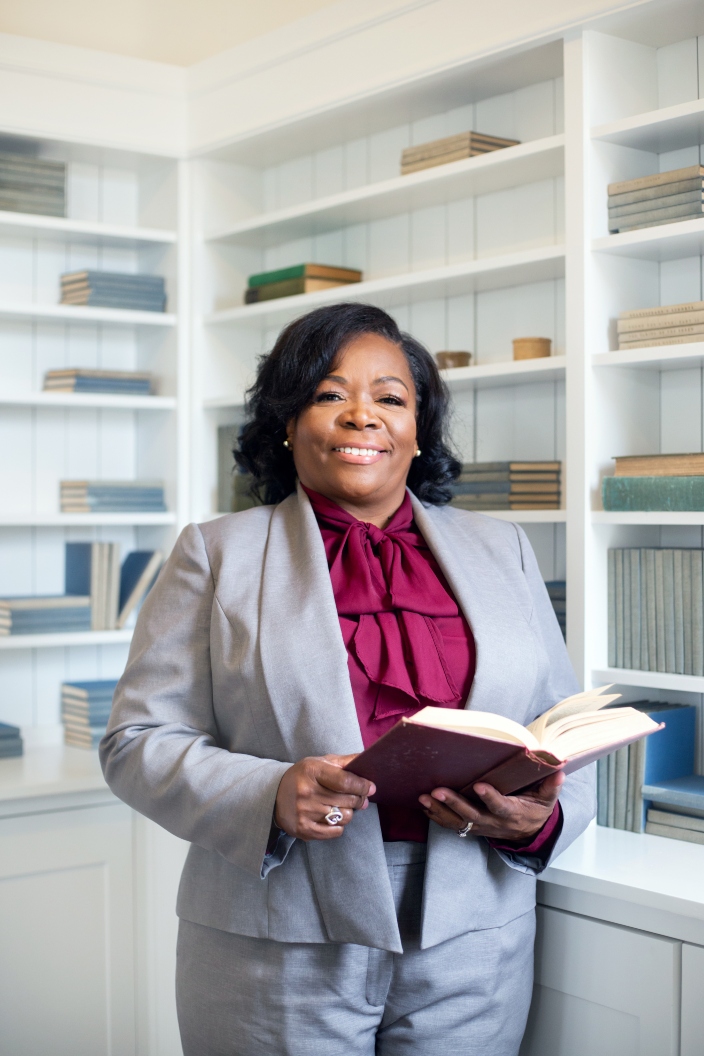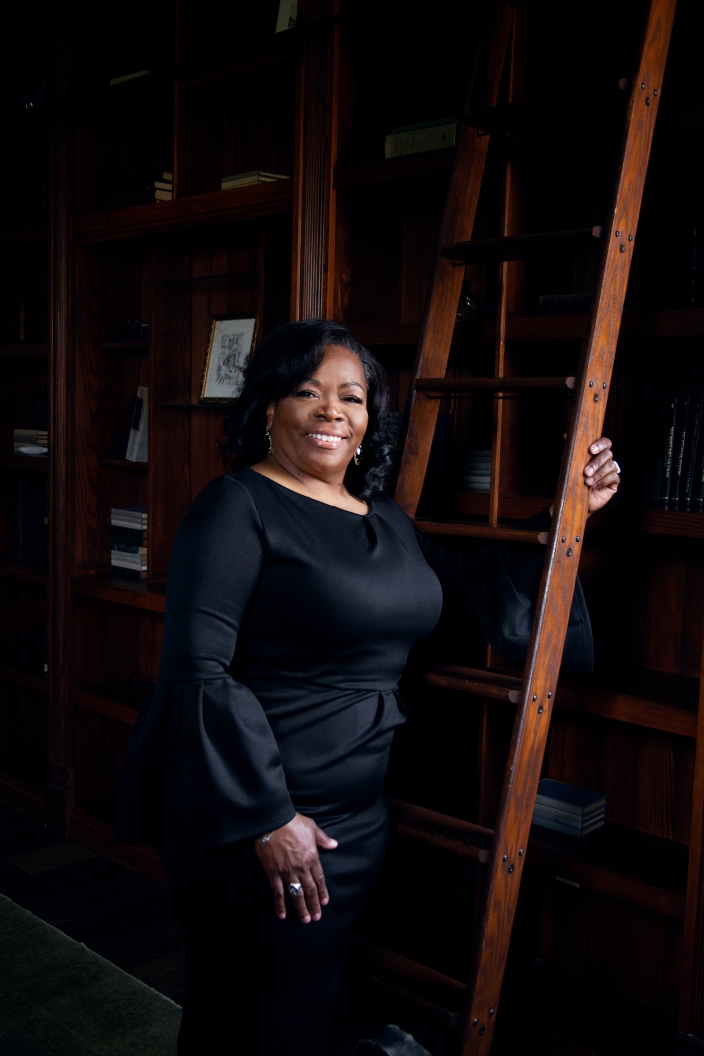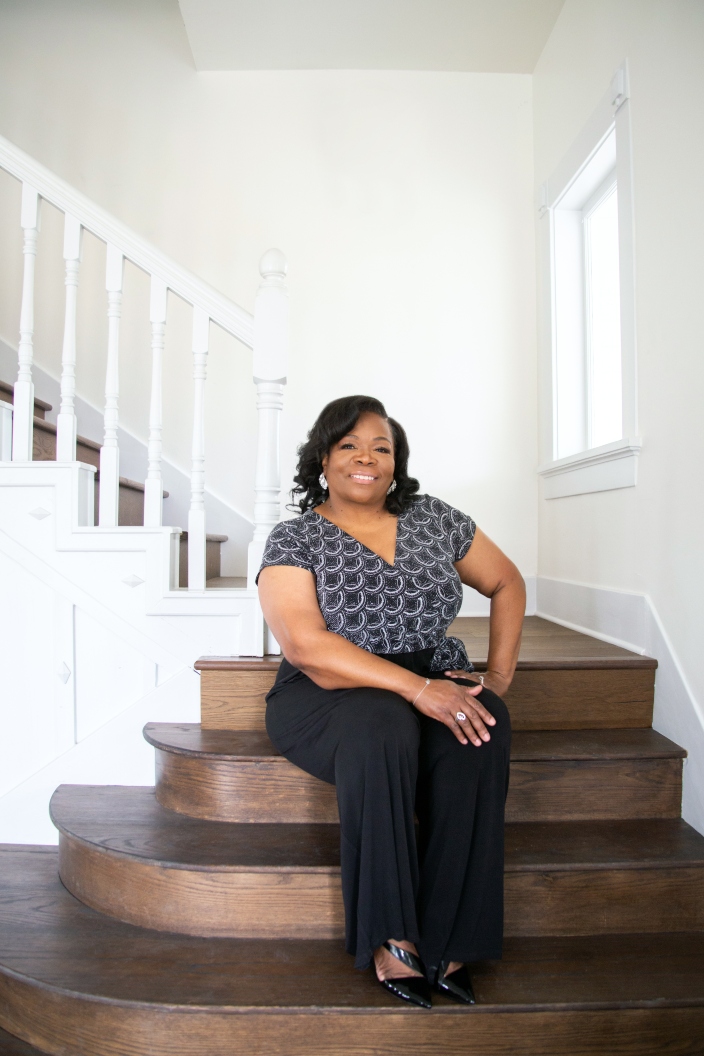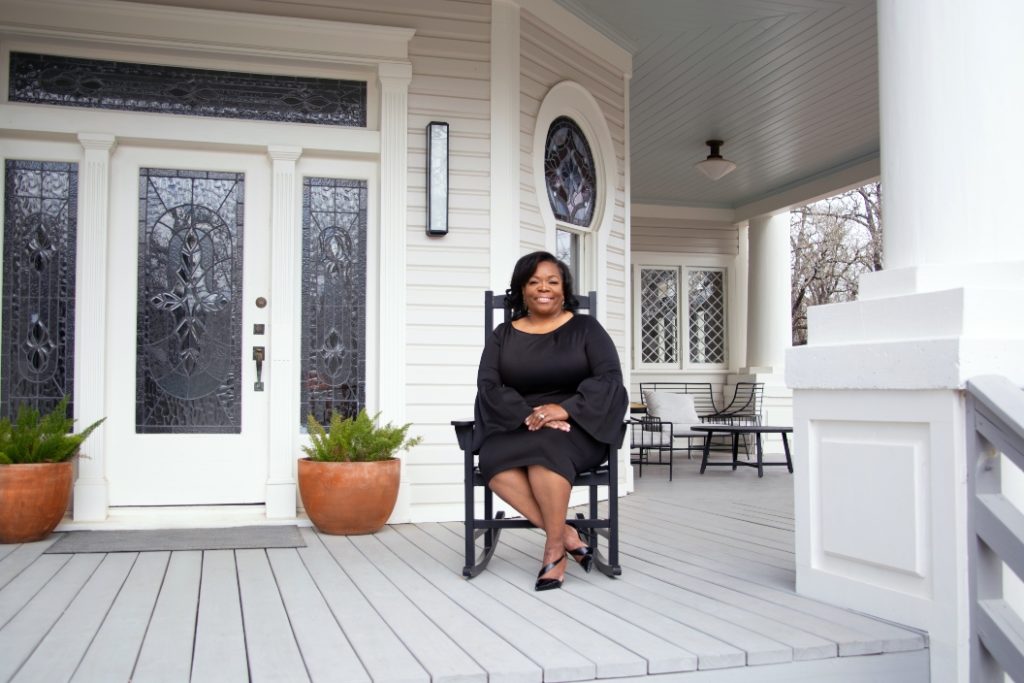Rose Smith has just finished the daily community grocery pickup she spearheads. Every day since the pandemic began in March, Smith, sometimes with a volunteer team and sometimes by herself, has fed over 35,000 people in Austin. The project began with only the five- and ten-dollar donations of a few Black women on the East Side. It now includes a curbside pickup, a home-delivery option and a partnership with Trader Joe’s.

The community feeding project is emblematic of much of Smith’s approach to life and business—innovative, optimistic, confident and community oriented. One can trace this approach back to her upbringing in the small farm community of Luling, Texas. Smith, her three siblings and her mother moved in with her grandparents when she was 9 years old after her father died.
“I am used to taking a little bit and making more. I grew up watching my grandmother feed seven people on a farmer’s and domestic’s salary. If we had financial difficulties I was unaware just based on the size of the spreads she made,” Smith chuckles.
Rose Smith: Humble Beginnings
Smith moved to Austin in the ’80s to attend the University of Texas. She worked a series of corporate jobs in sales and marketing. This included leading sales teams at the Wall Street Journal and General Motors. Smith was also a high school athlete, and that competitive drive followed her into the workplace. “I am mostly competitive with myself,” she says. “I chose sales because I love competition. Never was satisfied that this was the best I could do. I always felt I could do more.”
Once during a short stint in East Texas, Smith convinced the manager of a local hotel to allow her to work as the hotel accountant from 10:00 p.m. to 6:00 a.m. Smith had a day job as an inventory manager at the local Walmart. But at the time she was a single mother and needed the extra money. For nine years, she worked overnight rectifying the day’s receipts while her kids slept in a hotel room that just happened to adjoin her office.
Rose Smith & Her Commitment to Austin’s East Side
Smith married her husband Charles Smith Jr. in 2009. Fittingly their first date was to play one-on-one basketball at Patterson Park in East Austin. They have six children and five grandchildren. The Smiths share a commitment to the east side of Austin and to family. Mr. Smith’s father, Charles Smith Sr., was one of the founders of the Blackland Neighborhood Association. The BNA successfully fought off the University of Texas expansion into their neighborhood in the 1980s. She again points to her grandparents and her upbringing as her main motivation.
“When I think about my grandfather, who was a World War II veteran, who had to quit school in the second grade to pick cotton to help his parents [who survived Jim Crow], who taught himself to read, to speak some Spanish, who built his own home and raised his daughter and his grandchildren, how could I not be motivated?”
Her grandfather raised her and her siblings to believe they could do anything they put their minds to. Smith took that message to heart. “There’s always going to be someone that doubts your abilities,” she says. “Don’t let one of them be you.”
The Best for Everyone
Like most Black female leaders, Smith’s ambition made her want the best for those around her. She took pleasure in creating the most diverse team of people with different personalities. And she made sure to keep up with their families. Often paying for professional development opportunities and prizes for hitting sales goals out of her own pocket. Smith’s employees and volunteers call her “Coach,” and after a two-hour conversation over Zoom, it’s clear why. The time was one part interview and two parts pep talk.

This desire to support other Black women and a love of coaching led her to create Black Women in Business (BWIB). “God actually gave me the vision for Black Women in Business in 2012. But I did not start until 2014,” Smith reveals. “I was worried about how it would be received. But I wanted to create a place for Black women who were so gifted and talented, but there were certain things they had missed along the way.”
In conceiving of Black Women in Business, Smith wanted to create a place for all Black women of various experience levels to feel welcomed and seen. “I wanted there to be an organization where there were no big I’s and little you’s,” Smith says. “If you know, I expect you to teach, and if you do not know, I expect you to ask.”
Black Women in Business is about helping the community. But it is also about helping Black women acquire the tools and skills they need to maximize their income. “I want women to compete not just for African-American dollars, but for all dollars,” she continues. “I wanted to see more Black businesses considered for big city contracts because we dotted our I’s and crossed our T’s.”
An important part of having a seat at the table is first knowing where the table is.
“These women did not lack intelligence or drive,” she says. “So many started their businesses while working another full-time job and raising kids with less access to credit and capital.”
Yet oftentimes Black women are overqualified and still excluded from the most powerful tables in Austin. “I see the same people getting the same accolades, the same opportunities year after year,” she laments. “I have women in my group who are ahead of them by leaps and bounds.”
It is that old adage in Black families: You have to be twice as good to get half as far. “It is mentally exhausting,” says Jenny DuFresne, entrepreneur and board chair for the Greater Austin Black Chamber of Commerce. “To know that you are best in class, that your team is best in class and you have done the work, [but]you are passed over or asked to work at a reduced rate. You have to take a step back and recalibrate everything to figure out [where you went wrong]and re-examine your entire process.”
Both women agree that Austin could do better. DuFresne even points to the relative ease of client work in Dallas. “There’s a lot of talk about diversity,” Smith says. “But I often find myself the only [Black woman] at the table.” Smith will always go where she is invited, but she would like to see more accountability and follow-through. “Corporations need to identify Black women and Black-owned businesses and buy their food, procure their services and be public about it,” DuFresne adds. “Money demonstrates what you actually value as a company and what we value as a country.”
What it Means to be a Black Woman In Business
According to a report by American Express, since 2007 the number of businesses owned by Black women has risen 164%. But according to a 2016 report by the National Women’s Business Council, Black women lag far behind when it comes to receipts. The report found that the average receipts for white-owned business was nine times that of Black-owned businesses. The disparity persists when broken down by gender. White woman-owned businesses average $189,037 in receipts while businesses owned by Black women average $69,101.
There are disparities in credit and access to capital as well. Black women are subject to higher loan rates and less likely to get the financing or investment capital they need. One report from the U.S. Small Business Administration found that women- and minority-owned businesses pay higher interest rates. They are also denied loans at higher rates than white business owners. (This remains true even when controlling for things like credit score.)

Smith is a realist. She understands that money is important. But she also tells the women in her chapters not to let it hold them back from building their dreams. “Take what you have, whatever you have inside of you and start with what you have,” she says. “Let your work speak for you. If you have not done the work what are you asking people to invest in?
“The frustrating and unfair thing is that many of my ladies have done the work for someone to invest in,” she says, referring back to that age-old anecdote. “It seems like those who have done far less work show up and get all the investments. What businessperson does not want someone who can multitask, who can take a little bit and make it go a long way?” She laughs to herself. “You would be surprised what I can do with $20.”
Given how she has kept her community fed for 10 months on a shoestring budget, surprise isn’t likely.
Investing in Women
Smith’s commitment to her community also matches research that suggests investing in women is one of the smartest ways to invest in communities. The United Nations has found that women invest more than 90% of what they earn back into their families. Black women often cite community and social activism as benefits of entrepreneurship. Says DuFresne, “Women reinvest in community because we are community builders, we are nation builders. But we also have businesses that take care [and]provide more jobs. Our businesses are more stable over longer periods of time because we’re running the budget and focus on things in a way that ensures sustainability and stability.”
Smith remains deeply committed to the flourishing East Side. She founded the Authentically East Austin Food Tour in 2018 to highlight Black-owned restaurants in East Austin. The food tour has expanded into The Black Dollar Tour and includes more Black-owned brick-and-mortar businesses. She got the City of Austin to recognize the second week in February as Black Business Week. And she also hosts an annual Black Women in Business event as a showcase for Black female business owners. “Black women business owners are showcased. But we want everyone to come out and support them,” she insists. The pandemic changed their plans. But both Black Women in Business and the Greater Black Chamber of Commerce keep vendor lists for any Austinite interested in spending their money with Black-owned businesses.
Austin Can Do Better
Smith is adamant that Austin can do a better job at making African Americans feel welcomed in the city. She recalls trying to take ladies from BWIB with her to City Hall or other community meetings with sadness. “They felt uncomfortable because they felt unwanted,” she laments. Her suggestion is that decision-makers attend community meetings. Visit local businesses and nonprofits rather than waiting for people of color to come to them. “Don’t just send someone who looks like us, you come too.”
Denisha Jenkins, owner of Kardia Advisory Group, describes this as the difference between diversity and equity. “Diversity is being invited to [the]party,” she says. “Equity is who is on the planning committee, who is making the decisions, who determines the guest list, who sets the rules.” Smith would like to see more Black female business owners setting the rules.
In her 50s now, Smith has some solemn advice for her younger self. She is introspective for several minutes before saying, “I wish I would have known that just being a powerful Black woman made me a threat. I wish I would have understood that some of the confrontations I endured were not about me, and seen that sometimes when people seem angry at you [it is because]they see a certain power or light in you and they sort of have to kind of get worked up to keep what’s in you from coming out. I wish I would have known that because I wouldn’t spend so much time arguing with people.”
“A force all by myself”
Smith wants women to understand the power they have within themselves. To be unafraid and unapologetic in letting it show. “I want women to realize their power. I want them to realize how amazing they are.” While acknowledging the challenges in the world and deploring the inequity, Smith says, “I always think in terms of possibilities and not limitations. People want Black women to think they are less than. But I am a force all by myself.”
She has once again spun gold out of straw, and she is quite content. “I have so much peace throughout my day.” Others may get more instant attention or support. But with triumphs like the pandemic feeding program that began with small donations and now partners with Trader Joe’s and H-E-B, Smith knows she has the receipts to prove she is the best investment. Maybe it is the athlete in her. She has once again shown her detractors and would-be competitors that no one beats Coach Smith.












